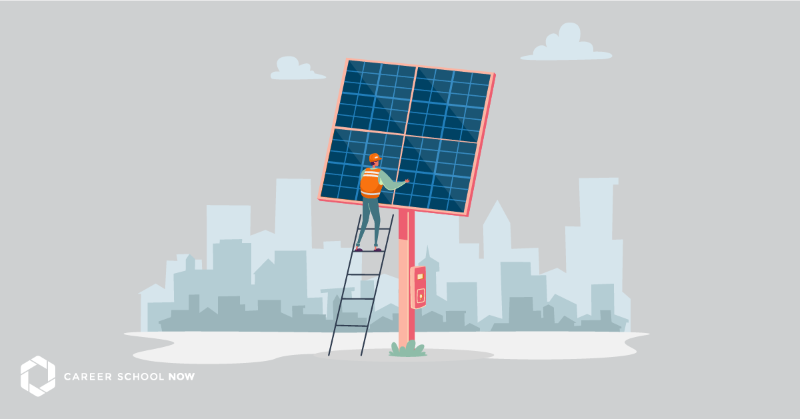
With solar panel installation becoming more affordable and our society’s shifting favor toward green energy solutions, the demand for solar panel technicians is projected to grow by 22% over the next decade (bls.gov, 2024). It’s a very promising industry to pursue if you’re savvy, technical, and are passionate about renewable energy.
What do Solar Panel Technicians Do?
Solar panels are typically installed on rooftops of houses/buildings. They absorb light energy from the sun and convert into electricity to power the building. Solar panel technicians assemble, install, and maintain solar panels on rooftops in accordance with site regulations. A technician will also be responsible for constructing support structures for solar panels and ensure they adhere to building codes and standards.
As one of the fastest growing industries in the nation, it is an extremely promising career path for those who are mechanically inclined, enjoy working outdoors, and are invested in renewable energy solutions.
The responsibilities of a solar panel technician vary, but include:
- Measure, craft, and assemble solar panels
- Ensure panels adhere to codes, standards, and schematics upon installation
- Weatherproof outdoor equipment and support mechanisms
- Activate and test equipment
- Conduct service and maintenance on previous installation jobs when needed
- Determine correct sizing and locations for solar panels
- Disconnect devices and install grounding and surge suppression equipment
- Capability to work at great heights and in small spaces
- Knowledge of wiring, electrical systems, and blueprints
- The ability to lift 50 pounds
What Other Skills Might I Need?
There are additional skills that make a strong solar panel technician. Listed below are just a few that may set you apart in the industry.
Critical Thinking
If you are not only capable of a successful installation, but are able to think through the process and anticipate any future issues, you will be a valuable technician. Being proactive at the beginning of your job will save you time in the end, leaving your clients happy and your employer impressed.
Physical Agility
By no means is it a requirement, but it will certainly make working outdoors and at considerable heights much easier, and the quality of your work will reflect that. If you are able to efficiently and safely work in varying conditions, lift heavy equipment, and you have excellent hand-eye coordination, it is very likely you will enjoy the job.
Communication
It’s one thing for you to have knowledge and experience under your belt, but if you can use it to your advantage when speaking to clients, you may gain a reputation as a favorable technician. If you can break down your intricate knowledge of mechanics into terms that are understandable for the clients you serve, your communication skills will be seen as a critical asset.
You also need strong communication abilities when collaborating on the job with other technicians. It’s important to ensure everyone is on the same page so work can be carried out as safely and effectively as possible.
Attention to Detail
As the one installing the panels, you will need to be detail-oriented and able to measure precisely. If these are skills that you have a natural inclination for, it will likely make the end result of your project seamless. Following schematics, adhering to design principals, and arranging and rearranging panels will all be made easier if you have a good eye.
Education Needed to Become a Solar Panel Technician
Solar panel technicians will typically be required to have either a high school diploma or GED. Once your educational requirements are met, you can learn through apprenticeships or on-site training.
Some technicians, however, attend technical school before beginning their career. If you choose to do so, it can serve as a strong steppingstone. You will likely take an electrical training program with classes that expand your knowledge in basic electrical theory, wiring and lighting, electrical control systems, and more!
We are partnered with leading schools across the nation that provide top-notch electrical training. Find on-campus or online programs available near you today!